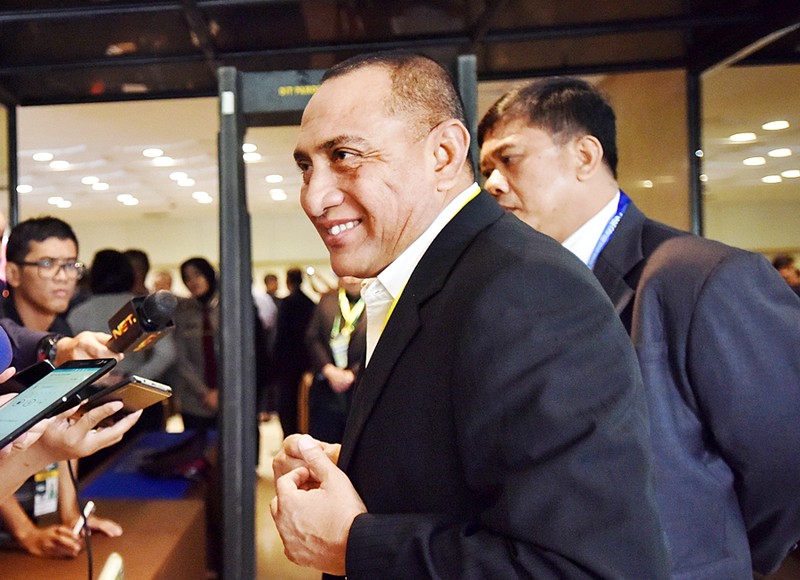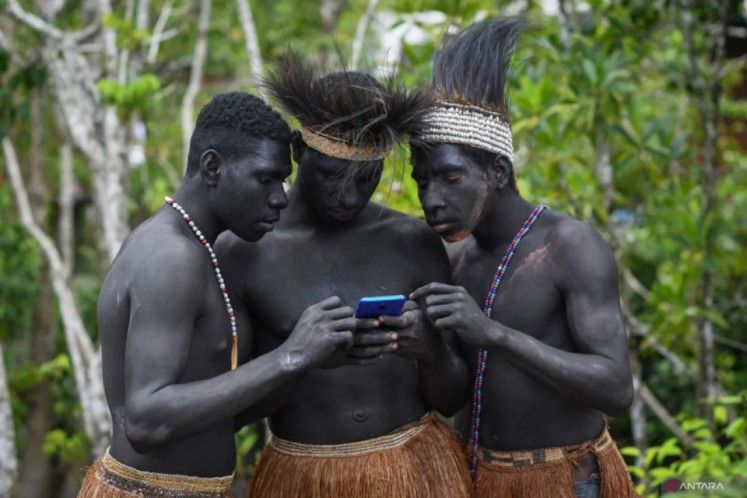Popular Reads
Top Results
Can't find what you're looking for?
View all search resultsPopular Reads
Top Results
Can't find what you're looking for?
View all search resultsCOMMENTARY: Generals in sports, a well played gambit?
Change text size
Gift Premium Articles
to Anyone
W
hen Indonesia commemorated National Heroes Day on Nov. 10, the Soccer Association of Indonesia (PSSI) elected Lt. Gen. Edy Rahmayadi, the chief of the Army’s Strategic Reserves Command (Kostrad), its new boss for the 2016-2020 term.
A week earlier, the Indonesian Badminton Association (PBSI) entrusted its top executive seat to Coordinating Political, Legal and Security Affairs Minister Gen. (ret.) Wiranto, who is also a former commander of the armed forces, in a unanimous decision.
Edy and Wiranto, each backed by a well-established military background and network, are now the most powerful men in the country’s most influential sport federations.
Indonesia is a soccer-crazy nation with the fourth-largest population in the world and a growing economy, making it a mouthwatering market for the global soccer industry. The only missing piece in Indonesian soccer is on-pitch achievement — currently it ranks 179th in the world.
Badminton, meanwhile, remains the only sport Indonesia can hope to excel in at Olympic Games and world competitions, although the country cannot match its own level of the 1970s, 1980s and 1990s.
President Joko “Jokowi” Widodo, as well as Youth and Sports Minister Imam Nahrawi, seem to get the hang of it and might have thought that allowing army generals to lead the important sport federations would make a difference.
It was common during Soeharto’s New Order era for active or former generals to hold top posts in sport federations and even on the National Olympic Council. The presence of the generals was considered necessary to imbue athletes with values of firmness, decisiveness, discipline and bravery. Indonesia’s soccer team once had to undergo a rigorous training stint in a military camp to improve the players’ discipline.
As history shows, some of the generals succeeded, others failed. And Indonesia must be ready for either scenario.
Edy, 55, carries a big responsibility for cleaning up the mess that has tarnished the PSSI’s image. Edy is the fourth military officer to lead the PSSI after Maulwi Saelan, a former deputy chief of the presidential guard unit under President Sukarno, who served in the PSSI from 19641967, Kardono, a retired vice marshal (1983-1991) and Agum Gumelar, a retired Army general (1999-2003).
In fact, internal chaos within the PSSI occurred when the federation was not under a military figure. The era of businessman-cum-politician Nurdin Halid (2003-2011) was marred with corruption, alleged match-fixing and poor handling of the national team, leagues, clubs and supporters.
One of Edy’s main tasks is to dust off the Nurdin regime’s debris from the 86-year-old sport federation.
Now that Indonesia has returned to its international peer group after a one-year FIFA ban, the national team has to gear up for the 2016 ASEAN Football Confederation (AFF) Cup, which starts this weekend in Myanmar and the Philippines; the 2017 Southeast Asian (SEA) Games in Kuala Lumpur; the 2018 Asian Games in Jakarta; and qualifier matches for the 2024 Olympic Games.
Although Edy is not an alien to the country’s soccer — given his post as patron of the PSMS Medan soccer club in North Sumatra and president director of the Indonesian Military (TNI) soccer club — without credible aides, he may lose his PSSI match even before finishing the first half. Besides, he has to divide his time and energy between the state duty as defender of the nation and commander of the national soccer federation.
The PBSI, meanwhile, is more familiar with military figures at the helm, having been led by six generals — including former vice president Try Sutrisno, former Jakarta governor Sutiyoso and former Army chief Djoko Santoso.
Among the six generals who chaired the PBSI in the past, only Djoko left office on a low note, as Indonesia’s badminton team failed to win any gold medal for the first time since 1992 at the 2012 Olympic Games in London.
Critics attributed Indonesia’s flop in badminton under Djoko to his failure to embrace Indonesia’s legendary shuttlers in helping him develop the sport and build up new players.
Shortly after the 2012 Olympic setback, the PBSI held a national congress to elect a new chief, and former Trade Minister Gita Wiryawan got the job. Gita, who served under then-president Susilo Bambang Yudhoyono, displayed laudable managerial skill as he found it easy to enlist the country’s masters in badminton to select and groom new talent, among others, by pairing young guns with seasoned players.
In 2013, Gita made a powerful move by luring Rexy Mainaky, one of world’s best men’s double players of all time, to come home and handle the national training camp. Before that, former World No. 1 Rexy (paired with Ricky Subagja) spent years, mostly in Malaysia (seven years), to build a post-playing career as a coach.
Under Gita’s leadership, Indonesian badminton also gave birth to Tontowi Ahmad and Liliyana Natsir, the world number one and gold medal winning pair at the 2016 Rio Olympics, winners of the 2013 Guangzhou World Championship and three-time All England champions.
Olympic gold has healed the wound of Indonesian sports. Let’s hope the 69-year-old ex-general Wiranto, walking in Gita’ shoes, will live up to his predecessor’s standards and not lose his focus on badminton amid his state duty to keep the country’s political stability intact.
Nevertheless, the appointment of Edy and Wiranto shows that Jokowi has picked a gambit in putting sports on his priority list. The result, however, remains to be seen.










